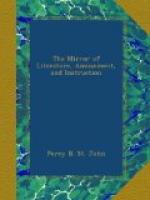The Fairfield weighed anchor on the 10th of August, in the morning.
The Pasha, enraged at this escape of Hassouna, summoned to his palace Mohamed Dghies, brother of the fugitive, and there, in the presence of his principal officers, commanded him, with a stern voice, to declare the truth. Mohamed fell at his master’s feet, and declared upon oath, and in writing, that his brother Hassouna had had Major Laing’s papers in his possession, but that he had delivered them up to a person, for a deduction of forty per cent. on the debts which he had contracted in France, and the recovery of which this person was endeavouring to obtain by legal proceedings.
The declaration of Mohamed extends to three pages, containing valuable and very numerous details respecting the delivery of the papers of the unfortunate Major, and all the circumstances of this strange transaction.
* * * * *
The shape and size of the Major’s papers are indicated with the most minute exactness; it is stated that these papers were taken from him near Timbuctoo, and subsequently delivered to the person abovementioned entire, and without breaking the seals of red wax—a circumstance which would demonstrate the participation of Hassouna in the assassination; for how can it be supposed otherwise, that the wretches who murdered the Major would have brought these packages to such a distance without having been tempted by cupidity, or even the curiosity so natural to savages, to break open their frail covers?
Mohamed, however, after he had left the palace, fearing that the Pasha in his anger would make him answerable for his brother’s crime, according to the usual mode of doing justice at Tripoli, hastened to seek refuge in the house of the person of whom we have spoken, and to implore his protection. Soon afterwards the consul-general of the Netherlands, accompanied by his colleagues the consuls-general of Sweden, Denmark, and Sardinia, proceeded to the residence of the person pointed out as the receiver, and in the name of Colonel Warrington, and by virtue of the declaration of Mohamed, called upon him instantly to restore Major Laing’s papers. He answered haughtily, that this declaration was only a tissue of calumnies; and Mohamed, on his side, trusting, doubtless, in a pretended inviolability, yielding, perhaps, to fallacious promises, retracted his declaration, completely disowned it, and even went so far as to deny his own hand-writing.
This recantation deceived nobody; the Pasha, in a transport of rage, sent to Mohamed his own son, Sidi Ali; this time influence was of no avail. Mohamed, threatened with being seized by the chiaoux, retracted his retractation; and in a new declaration, in the presence of all the consuls, confirmed that which he made in the morning before the Pasha and his officers.
One consolatory fact results from these afflicting details: the papers of Major Laing exist, and the learned world will rejoice at the intelligence; but in the name of humanity, in the name of science, in the name of the national honour—compromised, perhaps, by disgraceful or criminal bargains—it must be hoped that justice may fall upon the guilty, whoever he may be.




